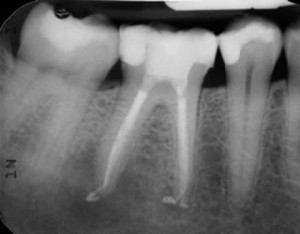Your Teeth – The Role and Health of the Tooth Root
This critical part of a tooth can sometimes present significant problems. Here’s why….
 Brushing our teeth twice a day is something that most of us will have had drilled into us by our parents from a very young age. Although this is good advice, less focus is sometimes placed on the ‘quality’ of brushing required.
Brushing our teeth twice a day is something that most of us will have had drilled into us by our parents from a very young age. Although this is good advice, less focus is sometimes placed on the ‘quality’ of brushing required.
Many people still ‘flat brush’ their teeth, paying attention largely to the visible tooth surface only. The rear of our teeth often gets less attention than it should, and one area that clearly can’t be accessed with tooth brushing, is the root below the gum line. So things can go wrong even when you might feel you are doing a great job with your brushing and flossing.
Whilst the roots of our teeth are protected by healthy gums, if the gums become infected, that can lead to big problems. Other issues, for example where infection spreads internally in the tooth, can also spell trouble.
In today’s Foxhall Dental Clinic blog, we will take a look at the role of the tooth root and what you can do to help make sure it remains healthy.
The role of the root
Before we look at the issues and treatments around the roots, it is worth remembering what their role is. The fact is that if our teeth roots are not healthy, then this may lead to wobbly teeth that can eventually fall out. Alternatively, the soft pulp part that sits in the root canals can become infected and require invasive treatment. A healthy root, on the other hand, helps to ensure that our teeth remain secure and strong, enabling us to eat without problems.
There are a number of things that can cause problems for a tooth root and we take a look at these now, along with what patients of your popular Ipswich dentist can do to give the root the best chance of remaining strong and healthy. Where problems do occur, we’ll also look at common treatment options.
Gum disease
Gum diseases such as gingivitis and periodontitis inevitably affect the gums, often causing issues such as bleeding and soreness. The more advanced stage though can also spread to the roots of the tooth as well as the surrounding bone tissue. If not treated, this is likely to lead to the tooth becoming loose and possibly even falling out.
The good news is that prevention is relatively straightforward with good brushing, including angling the bristles so they reach into the gum line, using dental floss to clean between the teeth if you don’t already do so and seeing your hygienist every six months or so. It is worth remembering that some medical conditions, such as diabetes, can increase your risk of gum disease, so do talk to your hygienist about this.
Treating gum disease may depend on the extent of it. For some situations, a sequence of ‘scale and polish’ treatments can be sufficient to get oral health back on track. Where infection has reached the roots though, a deep clean or root scaling may be needed. This is an invasive treatment and prevention is a far better option where possible.
Tooth decay
A common problem for many of us often due to a high sugar consumption or poor cleaning. Minor cases of decay can usually be restored relatively easily with a filling and should be treated as soon as possible for this reason. The deeper the decay goes, the more likely a root canal infection is. This can be very painful and requires more complex treatment.
Preventing tooth decay is similar to the above, with good quality brushing of the teeth and the use of dental floss. Being careful about what you eat and drink can help with this too, especially if you can cut out a lot of sugar from your diet. Acidic ‘fizzy’ drinks can also damage the tooth enamel which makes tooth decay more likely.
Treatment often involves the use of a filling or possibly a crown where damage is more significant. In the event of the root canals becoming infected, you will need to have a root canal procedure to save the tooth. The only other option is extraction which we generally only recommend as a last resort.
Trauma
If you suffer a blow to the face or fall and hit your face, your tooth roots can suffer from damage. If this happens to you, you should first of all visit your local A&E in case of any head trauma. If you suspect any damage to your teeth, even if not visible, you should also contact our Ipswich dentists for an appointment. Just because there is no visible damage to a tooth does not mean that the roots are not affected.
Preventing accidents is obviously difficult but some precautions can be taken, such as wearing a mouthguard if you play a contact sport. A little thought on how to prevent this in your line of activity can help you to save your teeth.
Treatment for any damage will naturally depend on the nature of it. The most important thing though is to seek help as soon as you possibly can after the damage has been done.
Ageing
Unfortunately, there is little or nothing that can be done to prevent us from becoming older. As we do so, various parts of our body become more susceptible to problems, and the tooth roots are no exception to this. The most important thing is that you look after your teeth well an keep regular six monthly appointments with the dentist and hygienist to give your teeth and gums the best chance of remaining healthy for as long as possible.
We hope that this blog has helped to give you some insight into this generally hidden part of the tooth and the best way to keep it healthy. If you would like to arrange an appointment at the Foxhall Dental Practice, please do so by calling us on 01473 258396.
